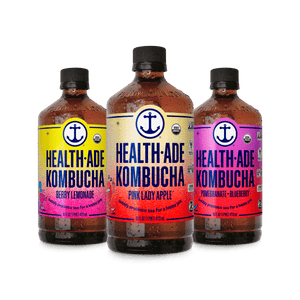
Kombucha | 12 Pack
Fan Favorite Variety Pack
One-time Purchase
49.95

Copied URL to clipboard!
You’ve probably heard of kombucha by now, but what is this trending fermented beverage, anyway?
You may wonder why all your health nut friends suddenly started carrying around kombucha bottles everywhere they go. Or maybe you notice them popping up more on the shelves of your local grocery store. Kombucha is more than just a trend.
The fizzy fermented tea has climbed to the top of the popularity ladder for its health benefits. Plus, it has a pretty refreshing and unique taste too!
Let’s take a look at what kombucha is, the health benefits of this bubbly probiotic tea, and why you may want to start making kombucha a part of your daily refreshment routine!
Let’s kick it off with a quick history lesson! Kombucha may be a relatively new trend, but it’s been around longer than most drinks.
The roots of kombucha go all the way back to around 220 B.C. It was invented in Northeast China and became popular for its healing properties. The name Kombucha stems from a Korean physician, Dr. Kombu. Dr. Kombu brought the fermented tea to Japan as a curative for Emperor Inkyo.
Spreading through trade expansions, kombucha became loved by countries like Russia and Germany in the early 20th century. Kombucha regained popularity in the 1960s after a study compared its health benefits to another probiotic-filled snack, yogurt.
Kombucha continues to maintain its popularity for its health benefits and uniquely tangy taste, and bubbly feel.

Kombucha is fermented tea. It can be made in dozens of different ways, but all methods center around four simple ingredients: tea, water, sugar, and a kombucha culture (sometimes referred to as a kombucha SCOBY which stands for symbiotic culture of bacteria).
This combination of ingredients is essential to fermentation - which is an essential part of making a batch of kombucha.
Kombucha is made by brewing a strong tea - most commonly black tea, green tea, or white tea leaves - which is then sweetened with sugar and stirred until the sugar dissolves. This strong, sweetened tea is then diluted with cool water, which reduces the strength and brings the liquid to an ideal temperature for the next step: the addition of culture.
Every culture is different, but they are usually unique combinations of bacteria and yeast - which, when added to sweet tea, begin to consume the sugar and nutrients in the tea and convert these to acid and trace amounts of alcohol. Fermentation takes place over the course of anywhere from days to weeks, and when it’s the right level of bubbly, tangy, sweet, and acidic - it’s finished kombucha!
Kombucha can be enjoyed in its pure original form or flavored with juice, herbs, botanicals, and flavorings. No matter what kombucha you flavor you choose, it’s characterized by a uniquely tangy, acidic, almost vinegary taste. Once you’ve become accustomed to the taste of kombucha - it’s nearly impossible not to crave it!

Beyond the crave-able flavor and tongue-tingling bubbles, kombucha has functional benefits! A naturally rich source of probiotics and healthy acids - which can aid in digestion and support the body’s natural detoxifying abilities and your gut health - kombucha is a treat that truly makes you feel as good as it tastes
Just a few of the things consumers love about kombucha:
Kombucha contains minimal caffeine. Since the caffeine in tea dissipates during fermentation, kombucha is a natural source of energy that won’t make you crash. The caffeine content in kombucha can vary depending on how long it’s left to steep and ferment, so if you’re sensitive to caffeine, you may be sensitive to some kombucha, even homemade kombucha.
A bottle of Health-Ade kombucha contains anywhere from 8 mg to 15 mg of caffeine per serving, depending on the flavor, where a regular coffee contains about 100mg of caffeine. Compared to a cup of coffee or tea, kombucha contains a relatively low amount of caffeine that won’t keep you up all night or make you feel jittery.
Kombucha contains a trace of alcohol from its fermentation process. This happens when yeast consumes and ferments sugar to produce CO2 and alcohol. Kombucha alcohol content is required to be lower than 0.5% ABV by law.
Keeping your store-bought kombucha properly refrigerated will help ensure the alcohol level remains stable (because once the kombucha gets warm, those gut-friendly probiotics get active again, and fermentation will continue).
Sugar is one of the four ingredients in kombucha, but most of the sugar gets consumed in fermentation. Kombucha has a significantly lower sugar level compared to other popular beverages.
Beverages are the number one source of added sugar in the average American diet. Kombucha is a healthier alternative to energy drinks, juices, and sodas. Many people enjoy drinking kombucha because they find it satisfies their sugar cravings in a way that also makes them feel good.
Kombucha is a natural beverage like juice - so you can drink it anytime it feels good to you! Many people like kombucha as an afternoon pick-me-up or a replacement for alcohol - but there’s no wrong time to enjoy kombucha!
Customize your kombucha experience with what your body needs! Find total refresh in Watermelon for a taste of summer-time, with organic cold-pressed watermelon juice producing the added flavors. Or reinvent your energy with a wake-up call from Cayenne Cleanse for a tingle of happiness.
More of a ginger kombucha traditionalist? Try our take with Ginger-Lemon, full of cold-pressed juice from organic, raw ginger and lemon!